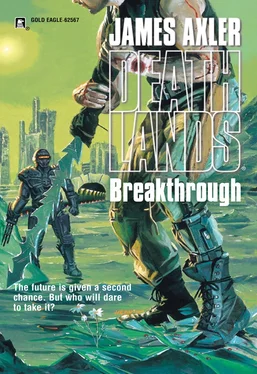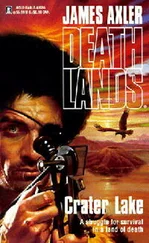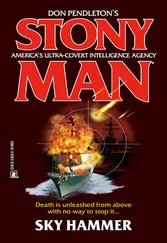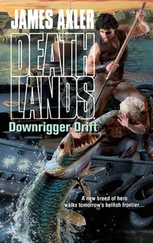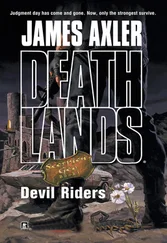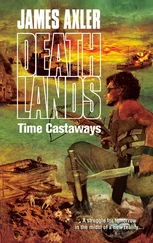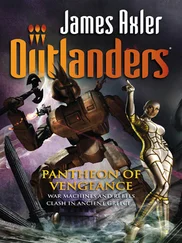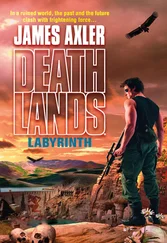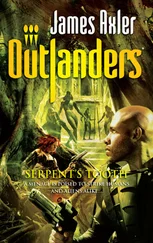Huth picked one of the little daisies and gingerly nibbled at the white petals. Their explosive bitterness made him gasp. He spit them out with a curse, then groaned as the vile taste set him to dry-heaving again.
Pale and shaken, he trudged on toward the distant smoke plume. The only sounds were the scrape of his shoe soles on the asphalt sand and the wheeze of his breathing. The day’s building heat made sweat ooze from his forehead. In the flat, shimmering distance lay the first of the dropped overpasses; he made slow but steady progress toward the jumble of concrete slabs.
When Huth first caught wind of the rank, feral odor, he didn’t know what to make of it, except that it wasn’t coming from him. As he continued walking, the smell got worse. Much worse. Only when the pack of robbers started popping up on either side of the ruined road did he understand the meaning of the noxious stench, and by then it was too late to run.
The dirt-caked, tangle-bearded bandits had been lying in wait in shallow hides they’d hacked into the desert hardpan. Their clothes consisted of countless layers of greasy rags; their boots were repaired with overlapping windings of strips cut from plastic bags. They carried battered black-powder shotguns and revolvers, rusting machetes and nail-studded wooden clubs.
As the robbers encircled him and closed in, the huge man who appeared to be the leader confronted him, toe to toe. He bore spiral-shaped brands on his cheeks and forehead. The angry welts of scar tissue looked like the tracks of some parasitic worm burrowing just under the skin. Below a mustache matted with dried saliva, Huth saw the snaggle stumps of yellow-brown teeth. The tip of the man’s wide nose bore a sparse tuft of black bristle, half an inch long.
“Good morning to you,” the scientist said, trying not to show his terror, and failing miserably. “I just arrived here from—”
Without warning, someone booted Huth in the buttocks so hard that his feet left the ground, so hard that his legs went numb and his knees buckled under him when he crash-landed. The bristle-nosed robber reached down and grabbed him by the collar, hauled him upright, then punched him straight in the face, breaking his nose and knocking him unconscious.
Huth came to with a moan as the big man kicked him in the ribs.
“What are these?” Bristle-nose demanded, holding a pair of small, flat objects in front of the scientist’s bloodied face.
“No, please,” Huth gasped, “those are my scientific instruments. Give them back. You can’t operate them. They are of absolutely no use to you.”
“He’s bossin’ me,” Bristle-nose said to the others as he cocked back his massive fist. “This dimmie bastard’s bossin’ me….”
Huth saw another short, straight punch coming at him, but there was nothing he could do about it. At the impact, as his head snapped back, something cracked. A lance of white-hot pain shot through his upper jaw, and his mouth was suddenly littered with sharp shards. In a gob of fresh blood, he spit out the remains of his two upper front teeth.
While Huth thrashed and bled, Bristle-nose showed off his booty. “Looks like predark gear to me,” he said. “Got to be worth a spoon or two of jolt over in Byram ville.”
With that, the big robber turned and started off in the direction of the smoke. The other bandits quickly stripped off the unprotesting scientist’s shoes and pants, leaving their victim his blood-sprayed and scorched lab coat and his tattered, gray-tinged underwear and socks.
Huth waited a long time before he risked uncoiling from a fetal position in the dirt. And he didn’t start walking again until the sun was high overhead. Hobbling slowly toward the shade of the nearest fallen highway overpass, he looked like the survivor of a train wreck. Blood had dried purple black all down the front of his lab coat. He couldn’t breathe through his swollen nose, and every time he sucked air through his mouth, electric needles of pain stabbed into the exposed nerves of his emptied tooth sockets.
As he stumbled along, he wept over the loss of his irreplaceable instruments, his permanent disfigurement and the unspeakable cruelty of fate. He was still sobbing when he reached the collapsed overpass. What he saw there put his suffering—and his predicament—in a new perspective.
At the foot of the largest block of concrete sat a line of sun-bleached human skeletons. He counted fourteen of them, all identically posed, their backs leaning against the block, elbows resting on raised kneecaps. Some were adults, some were small children, some still had isolated patches of hair on their massively caved-in skulls. A couple of feet above the row of drop-jaw grins, someone had chiseled three tall, spindly words into the eroded concrete.
Welkum Too Deflanz.
Fifteen days after a massive explosion destroyed the upper floors of the Totality Concept complex, Dredda Otis Trask stood naked and alone in a windowless stainless-steel room. The small, unfurnished chamber had two doors, both heavily gasketed and airtight. A warm wetness trickled down the insides of her thighs. Not blood, but the remnants of a clear surgical lubricant, melted by her body heat. The CEO of Omnico, one of the most powerful people on the planet, had just had her womb stripped of all its eggs.
In itself, there was nothing unusual about the procedure. On her world, the in-vitro-fertilized eggs of the executive class were routinely carried to term by surrogate mothers conscripted from the ranks of the white collars.
Nor was it strange that Dredda Otis Trask had chosen to have the extraction performed in the secure, private facilities of her own global conglomerate. But Omnico’s CEO hadn’t surrendered all her potential offspring to a test tube merely for the sake of convenience. Given the nature of the dangerous experimental treatment she was about to undertake, it was a necessary precaution.
Above Dredda’s head on a wall bracket was a vidcam, its op light glowing ruby red. A team of faceless, nameless strangers was observing her through the fish-eye lens.
“Please stand beneath the ceiling nozzles,” said a voice through the vidcam’s speaker.
When Dredda stepped over the center-sloping floor’s single drain, the shower spray commenced. The hot water that enveloped her was followed by foaming, pea-green jets of bactericide. After she had rinsed off the foam, vents along the base of the walls blasted her with heated air, drying her to the point of itchiness in a matter of seconds. As she raked her static-charged, auburn hair back behind her ears, an electronic lock snicked and the exit door popped outward a foot.
Through the tiny speaker, the voice said, “Please proceed to Level Three containment.”
Dredda immediately moved into the well-lit, polished metal hallway, which was also windowless. She could have touched the ceiling with a raised hand, and the corridor was so narrow it wouldn’t permit the full spread of her arms. The air hung heavy with a mist of disinfectant that stung the back of her throat. Auto-tracking vidcams mounted at intervals along the ceiling followed her barefoot progress to the next chamber, which was even smaller.
The bioengineering facility’s hazard-containment system consisted of a series of concentric, hermetically sealed, metal enclosures. The more dangerous the biological materials, the smaller the enclosure in which they were stored. Level One’s barrier, which took up an entire subfloor of the Omnico skyscraper, encompassed containment Levels Two through Four, Level Two encompassed Three and Four, and so on. Each of the interiors was reverse-pressurized so that if a seal failure occurred, external air would rush in, keeping contaminants from escaping to the next level.
Читать дальше
